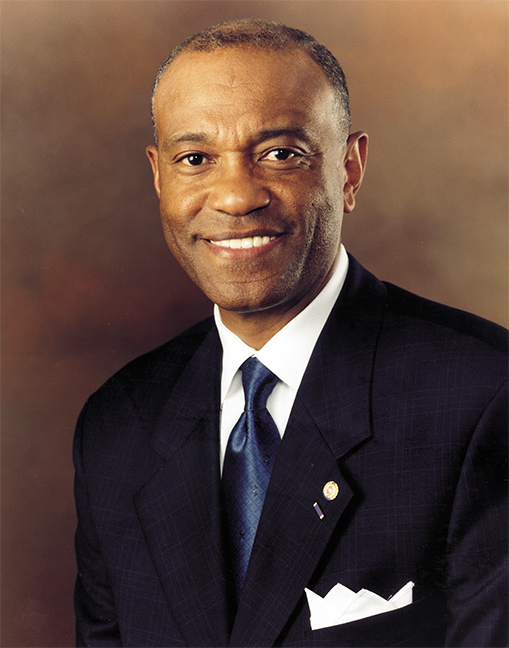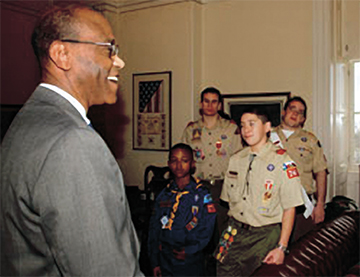
Kansas connection. Howard S. Liebengood, who served from Jan. 5, 1981
to Sept. 12, 1983, graduated from Kansas State University; Ernest E. Garcia,
who served from June 3, 1985 until Jan. 5, 1987 and is now senior assistant
to the Wichita city manager, attended Wichita State and graduated from the
University of Kansas; and Alfonso E. Lenhardt, the current sergeant at arms,
who is pictured at left, earned the master’s degree in administration of justice
from Wichita State in 1976.
Matter-of-factly, the U.S. Senate Sergeant at Arms’ Internet home page states: “Alfonso E. Lenhardt was elected and sworn in as the 36th Sergeant at Arms of the Senate on Sept. 4, 2001.”
Outside the Capitol, this news registered barely a blip on the radar screen, and it was important on Capitol Hill and to a few special-interest media outlets only because Lenhardt is the first African American to hold such a post in either the House or the Senate. Yet in a scant week’s time, this WSU alumnus would play a critical role in the government’s response to Sept. 11 and, a month later, to the anthrax emergency that closed the Hart Senate Office Building for 92 days.
Al Lenhardt ’76 is actually an alumnus of several universities. He earned the BS degree in criminal justice from the University of Nebraska, the MA degree in public administration from Central Michigan University and the MS degree in administration of justice from Wichita State. He also completed postgraduate studies at Harvard University’s Kennedy School of Government and the University of Michigan’s Executive Business School.
Born in New York City, Lenhardt later embarked upon a military career that was to span almost 32 years.
“In 1965, I was attending Pace University,” he remembers. “I dropped out to get married — to Jacqueline, my wife of 36 years now — and one week later I received my draft notice.” He entered the service as a private, but the Army wanted him to go to Officer Candidates School. “It never occurred to me to pursue a career in the military,” Lenhardt remarks, “but I’ve always believed in maximizing potential and exploring opportunities — which was why I had been going to college in the first place — so I went.”He was commissioned in 1966 as a second lieutenant of infantry and was immediately shipped off to Vietnam, where he served for 14 months with the 199th Light Infantry Brigade based in and around Bien Hua. That unit became one of the Army’s most highly praised and decorated units, and Lenhardt himself, having sustained serious wounds in battle, received many awards, including the Purple Heart, the Bronze Star, the Legion of Merit Medal and the Distinguished Service Award.
Education and Experience
"Al Lenhardt holds the most powerful and prestigious non-elected position in the Capitol, and it speaks well for him that all 100 senators approved his appointment." Tom Daschle, Senate Majority Leader
Lenhardt continued his education in conjunction with attendance at the Command and General Staff College at Fort Leavenworth, Kan. He explains, “Part of the Army’s program for ongoing preparation is to routinely send its officers out to acquire new knowledge and ideas from universities. It’s a formalized program, and the Army generously allows time to finish degrees.” Then a captain, Lenhardt completed WSU’s graduate program in administration of justice.
“It was a good, demanding program,” he says, “and, combined with other experiences, it prepared me very well for tough situations I faced through the years, including the events of and after 9-11. I’m pleased to count Wichita State among my alma maters.”
Lenhardt’s subsequent commands included serving as senior military police officer for Army police operations and security matters and serving as commanding general of the U.S. Army Recruiting Command, Fort Knox, Ky., where he directed more than 13,000 people in more than 1,800 locations. He retired from the Army as a major general in 1997 and became coo and executive vice president for the Council on Foundations. And in 2001, a convergence of unlikely events carried him onto the Senate floor — and into the Beltway limelight.
Destiny Comes Calling
Peter Rouse, chief of staff to Senate Majority Leader Tom Daschle, explains, “Both the sergeant at arms and the secretary of the Senate are nominated by the Senate majority leader and are subject to approval by the full Senate. Both jobs have critical importance and scope.”
Specifically, Rouse says that the sergeant at arms is in charge of a staff of 700 to 800 people and an annual budget of $135 million, oversees law enforcement and security on the Senate grounds, acts as the Senate’s chief protocol officer and is responsible for the administration and management of the entire Senate infrastructure, which includes telecommunications and computers, Senate chambers and galleries, and the general operation of all Senate facilities.
 When the Democrats assumed control of the Senate in June 2001 and the standing sergeant at arms coincidentally accepted a job elsewhere, Tom Daschle had the opportunity to name someone new to the post. The recently sworn-in secretary of the senate, Jeri Thomson — who had attended classes with Lenhardt at the Kennedy School — remembers thinking, “He’s the guy,” and she brought Lenhardt’s name to Daschle’s attention.
When the Democrats assumed control of the Senate in June 2001 and the standing sergeant at arms coincidentally accepted a job elsewhere, Tom Daschle had the opportunity to name someone new to the post. The recently sworn-in secretary of the senate, Jeri Thomson — who had attended classes with Lenhardt at the Kennedy School — remembers thinking, “He’s the guy,” and she brought Lenhardt’s name to Daschle’s attention.
Rouse comments, “Tom was looking for the best possible person he could find who could handle the law enforcement, protocol and, especially, the management of information systems, and Al looked like a very good fit.”
At the Council on Foundations, Lenhardt was ambivalent about changing jobs.
“I was very happy where I was,” he says, “but when I met with Tom, I liked the man immediately, and when he told me his vision of what he wanted to accomplish as leader of the majority party, I had to say ‘yes.’” Daschle declares, “I’ve come to admire and respect Al even more since he came on board, and I don’t know that we’ve ever had a sergeant at arms who has brought his level of background, experience, dedication and professionalism to the job.”
Role and Scope
Since the events of Sept. 11 and the anthrax scare, Lenhardt’s job has become even more complex. “Al was in place for barely a week before the world changed forever,” says Rouse. “His was a huge job before 9-11, and it’s become even more so since then, as well as a much different job.” Daschle says, “Al rose to the challenges of both occasions magnificently. Having no thought for his own personal safety, he was right in the middle of the anthrax emergency, literally and figuratively. In hindsight, he was one of the best personnel choices I’ve made since becoming majority leader.”
By all accounts, Lenhardt was cool, calm and professional — even heroic — during both crises. Daschle, Rouse and Thomson speculate that enduring hostile fire in Vietnam and overseeing huge operations for the Army for almost three decades seasoned him well for manifesting consummate grace under pressure.
However, Lenhardt himself is not inclined to view his decisive responses as “heroic,” saying only, “The military does an excellent job of preparing its officers. Given my Army background and my education, the events of Sept. 11 and the anthrax emergency did not unnerve me to the extent that I couldn’t step in and do what was necessary. That’s what I was trained to do.”
Indeed, his command of the fluid scenarios of September and October read like a well-conceived and -executed battle plan. “Al was galvanized by those events,” Rouse declares, “and he is revolutionizing, every day, the position of sergeant at arms.” Thomson says, “Al was just incredible. Keep in mind there was no precedent for him to follow, regarding either 9-11 or the anthrax evacuation and remediation, the largest single bioterrorism event to take place on U.S. soil.”
Opportunity and Preparation
Working closely with John Eisold, the attending physician to Congress, Lenhardt oversaw the largest clinical trial for anthrax contamination through to its successful conclusion. “We’re very proud of the fact that, here on Capitol Hill at least,” he says, “no one so much as even got sick as a result of anthrax.”
Reflecting on the ordeal, Thomson says, “It made us feel much more secure to know that someone was in charge who knew what he was doing.”
Once again, Lenhardt gracefully deflects such praise: “As an experienced Army general, such emergencies are not alien to me. And I’ve always believed in that old saying, ‘Real luck is where opportunity meets preparation.’” Issues of foresight, training and destiny aside, Lenhardt was the right man in the right place at the right time — by a sheer stroke of luck.
Kat Schneider ’72





